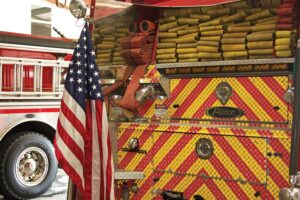The call comes requiring immediate action. You hop in your truck and rush to the firehouse, quickly throw on 70 pounds of equipment and head out to the emergency. Time is of the essence and others are depending on your quick action.
That is the life of an emergency responder, never knowing when that call will come, day or night, but being willing to drop everything and go.
Helping others gives many a sense of satisfaction and fulfillment. Knowing that the willingness to act has a real impact on others’ lives keeps the “fire burning” in volunteer firefighters. That concern for community is one of seven cooperative principles on which electric cooperatives are based.
Volunteer firefighters come from all walks of life and that includes many members and employees of rural electric cooperatives. The vast majority of disasters such as tornados, car or train accidents, etc. occur in small town America. In fact, 70 percent of fire departments in Illinois consist of volunteers, which number between 42,000 and 46,000, but are dwindling.
Volunteerism is a natural fit in the co-op world. They may be from your family, neighborhood or co-op and are familiar faces at local businesses, churches and schools. It is not at all uncommon for firefighting to be a family legacy of sorts. Grandfathers, fathers and sons may all be volunteers at your local department, as is the case with Denny Kingren of Paxton, a warehouseman for Eastern Illini Electric Cooperative; Craig Benhoff, a lineman for Clinton County Electric Cooperative and Russ Camp, a journeyman lineman for EnerStar Electric Cooperative.
Kingren is Chief of the Paxton Fire Department and has been a volunteer firefighter for 40 years. His father, brother and sons have all been part of the department and one son is now a professional firefighter in Urbana. Benhoff is a third generation firefighter, and his brother is currently on the department with him and Camp followed in his father’s footsteps as well.
There is very little money in being a volunteer firefighter; payment comes in the satisfaction of knowing your willingness to help had an impact. According to Kingren, Paxton firefighters only make between $200-$600 per year, which doesn’t come close to compensating them for the number of hours they spend in weekly training and going on calls.
“You might get a little bored because of the lack of activity in a smaller department,” says Kingren, “but once you go out, whether it be an accident on the interstate, someone having a problem at home or a medical incident, it revives your energy. You realize it’s a big deal!”
While there isn’t a standard that must be followed, training at the Paxton Fire Department is based on the standards of Illinois Firefighter II as set up by the Illinois Fire Service in Champaign. Even though it’s not mandated, Kingren believes there will be a requirement in the future for volunteers to achieve Firefighter II within two years. Paxton is fortunate to have had professional firefighters living in the community who have been willing to come to training meetings and pass on information.
 Kingren believes the biggest challenges facing volunteer departments today are recruitment and money to operate. “The bigger you are as a volunteer system, the easier it is to keep people,” says Kingren. “If they are being regularly trained by the department, are using that info, and it is staying fresh, they are more excited about it. We don’t want people’s homes to burn down, but once it happens, and you’re involved, you stop and say, ‘Hey, I was able to use this knowledge!’”
Kingren believes the biggest challenges facing volunteer departments today are recruitment and money to operate. “The bigger you are as a volunteer system, the easier it is to keep people,” says Kingren. “If they are being regularly trained by the department, are using that info, and it is staying fresh, they are more excited about it. We don’t want people’s homes to burn down, but once it happens, and you’re involved, you stop and say, ‘Hey, I was able to use this knowledge!’”
Smaller departments have trouble because of the population of the community. If it’s a very small department it’s harder to keep people. He has even heard of volunteer departments using announcements on television and radio in an attempt to recruit.
Having an age span in the department is important as well. It’s easy to overheat with all the gear strapped on and the heat from the fire. “It’s hard on the body, especially when it’s hot outside. It’s good to be able to rotate guys in and out,” Kingren says. “That’s where having youngsters in the department really helps.”
Benhoff, one of those “youngsters”, says the biggest challenges for him are being on-call 24/7 and some of the things he has to see and do to help those in need, but always doing his best.
Operating capital is tight and equipment is expensive for fire departments. As more mandates are placed on the fire industry and engines, the prices have risen sharply. When Kingren joined the department in 1973, a fire engine was purchased for $27,000. They are in the process of buying a new one in the next year and it will probably cost in excess of $400,000. Paxton typically runs its engines until they are 30 years old.
Most departments depend on tax base and fundraising to make ends meet. Paxton has an annual Harley Davidson community fundraiser that is popular and brings the community together for an afternoon of fun.
Volunteer fire departments across the state of Illinois are actively recruiting more firefighters and are always looking for dedicated staff who are willing to answer the call. According to John Swan, President of the Illinois Firefighters Association and Chief of the Colona Fire Department, “Most fire departments are made up of 30 or more members, but that is disappearing rapidly. The biggest problem today is time restraints for volunteers,” says Swan. “If the firefighters are married, most households need two incomes. The majority of firefighters are not working in the small towns as they were in the past, which leaves daytime very short on available personnel. There are also family commitments and lack of time it takes to be properly trained.
“The volunteer fire service in Illinois could cost residences in the billions of dollars if not properly maintained, which would lead to longer response times and costs in terms of life and property,” Swan explains.
According to the National Volunteer Fire Council, half of all Americans live in communities served by fire departments that are either volunteer or a combination of volunteer and career (full-time and paid). Volunteer departments save communities a significant amount of money. It is estimated it would cost U.S. taxpayers $128 billion every year if all the volunteer first responders were replaced with career staff.
If you are interested in learning more about volunteering, contact your local department or go to www.illinoisfirefighters.org.








